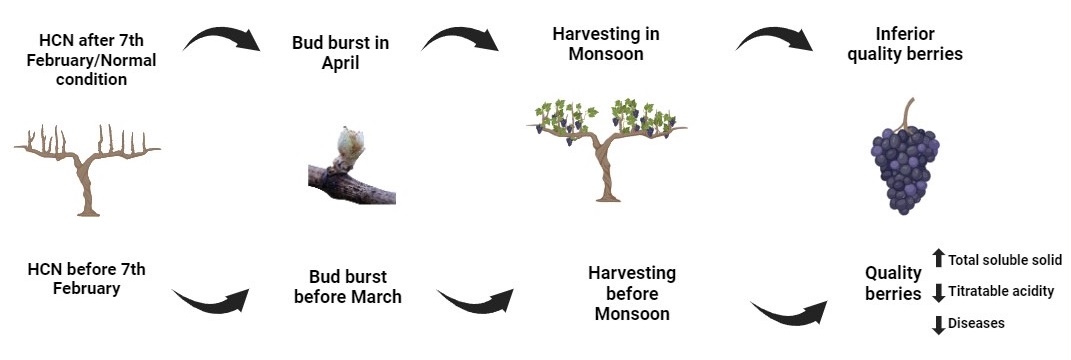Pruning date and hydrogen cyanamide effects on growth and yield of grapevine var. Cabernet Sauvignon

Published 2024-10-23
Keywords
- Budbreaker,
- budburst,
- hydrogen cyanamide,
- pruning,
- viticulture
How to Cite
Copyright (c) 2024 Nishes Ghimire, Puja Sapkota, Pragya Poudel, Kishor Chandra Dahal

This work is licensed under a Creative Commons Attribution 4.0 International License.
Abstract
Harvesting the grapes before the monsoon season is crucial to ensure the quality of berry and bunches. This study aims to identify the optimal window for pruning and hydrogen cyanamide (HC) application to prepone the berry harvesting. The experiment was conducted in randomized complete block design with five treatments and four replications. Treatments were five different pruning dates in 2021: Jan. 17, Jan. 24, Jan. 31, Feb. 7 and Feb. 14, followed by 5% HC application one week after pruning. Annual growth stages of grapevine were recorded by using modified E-L growth stage; reproductive attributes recorded during flowering; and vine yield and berry quality attributes recorded at harvesting. The earlier pruning resulted earlier budburst compared to late pruning. Vines prunefed after Feb. 7 had <50% budburst, while vines pruned before Feb. 7 reached 50% budburst, exhibiting no differences in number of days needed to achieve it. Jan. 17 pruning had the highest budburst (%) and bud fruitfulness (%), where pruning on Feb. 7 had lower values. Average bunch weight did not differ while berry quality attributes differed between treatments for the same day harvest. The negative responses in late pruned and HC treated vines, potentially attributed to the phytotoxic effect of HC on tender buds near the natural time of dormancy break. The early pruning and subsequent application of HC triggered earlier budburst, and advances flowering and harvesting of berries in grapevine. This research demonstrated a potential techniques for advancing harvesting time (2-3 weeks) in grapevine.





